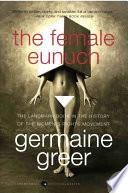Introduction
The Female Eunuch (1970)
Context: The fear of freedom is strong in us. We call it chaos or anarchy, and the words are threatening. We live in a true chaos of contradicting authorities, an age of conformism without community, of proximity without communication. We could only fear chaos if we imagined that it was unknown to us, but in fact we know it very well. It is unlikely that the techniques of liberation spontaneously adopted by women will be in such fierce conflict as exists between warring self-interests and conflicting dogmas, for they will not seek to eliminate all systems but their own. However diverse they may be, they need not be utterly irreconcilable, because they will not be conquistatorial.
Quotes from book
The Female Eunuch

The Female Eunuch is a 1970 book by Germaine Greer that became an international bestseller and an important text in the feminist movement. Greer's thesis is that the "traditional" suburban, consumerist, nuclear family represses women sexually, and that this devitalises them, rendering them eunuchs. The book was published in London in October 1970. It received a mixed reception, but by March 1971, it had nearly sold out its second printing. It has been translated into eleven languages.A sequel to The Female Eunuch, entitled The Whole Woman, was published in 1999.
The Stereotype
The Female Eunuch (1970)
Context: The stereotype is the Eternal Feminine. She is the Sexual Object sought by all men, and by all woman. She is of neither sex, for she has herself no sex at all. Her value is solely attested by the demand she excites in others. All she must contribute is her existence. She need achieve nothing, for she has herself no sex at all. her value is solely attested by the demand she excites in others. All she must contribute is her existence. She need achieve nothing, for she is the reward of achievement. She need never give positive evidence of her moral character because virtue is assumed from her loveliness, and her passivity.
Introduction
The Female Eunuch (1970)
Context: The fear of freedom is strong in us. We call it chaos or anarchy, and the words are threatening. We live in a true chaos of contradicting authorities, an age of conformism without community, of proximity without communication. We could only fear chaos if we imagined that it was unknown to us, but in fact we know it very well. It is unlikely that the techniques of liberation spontaneously adopted by women will be in such fierce conflict as exists between warring self-interests and conflicting dogmas, for they will not seek to eliminate all systems but their own. However diverse they may be, they need not be utterly irreconcilable, because they will not be conquistatorial.
Womanpower (p. 129)
The Female Eunuch (1970)
Context: Women have been charged with deviousness and duplicity since the dawn of civilization so they have never been able to pretend that their masks were anything but masks. It is a slender case but perhaps it does mean that women have always been in closer contact with reality than men: it would seem to be the just recompense for being deprived of idealism.
“The fear of freedom is strong in us. We call it chaos or anarchy, and the words are threatening.”
Introduction
The Female Eunuch (1970)
Context: The fear of freedom is strong in us. We call it chaos or anarchy, and the words are threatening. We live in a true chaos of contradicting authorities, an age of conformism without community, of proximity without communication. We could only fear chaos if we imagined that it was unknown to us, but in fact we know it very well. It is unlikely that the techniques of liberation spontaneously adopted by women will be in such fierce conflict as exists between warring self-interests and conflicting dogmas, for they will not seek to eliminate all systems but their own. However diverse they may be, they need not be utterly irreconcilable, because they will not be conquistatorial.